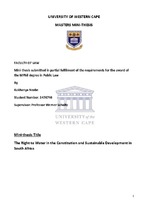| dc.description.abstract | The South African Constitution, 1996 has placed the right to sufficient water as a
Constitutional right. The provision of this right by the Constitution intends to redress
the violation of human rights, to ensure that South Africa’s scarce water resources
are protected from pollution and that every South African, including the poor and
the marginalised, enjoys them. Consequently, the Constitution has placed a legal
obligation on the government to realise the right to have access to sufficient
water. In order for the government to fulfil its obligation to provide water as a right
for present and future generations, it will need to implement the relevant
legislation effectively to protect the country’s water resources. This study analyses
Section 27 of the Constitution, which provides for the right to access to water, and
the role of sustainability in conserving and protecting water resources, given the
recurring water challenges. | en_US |

